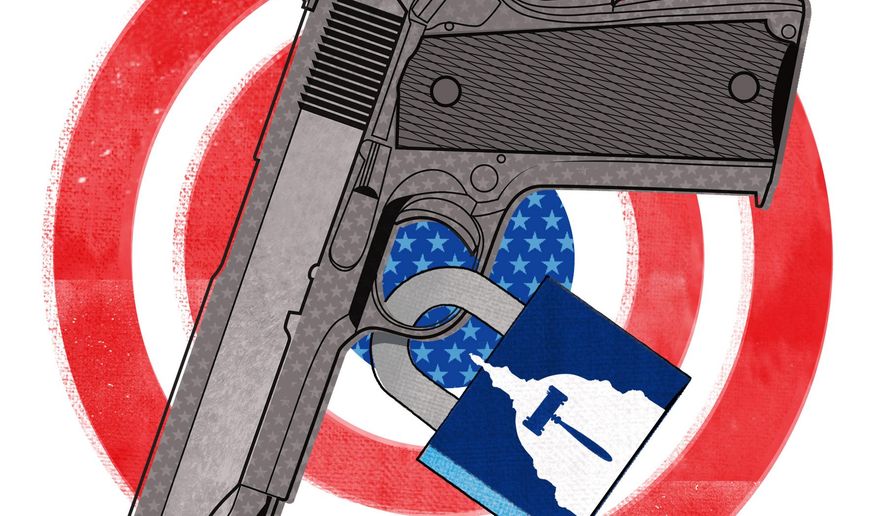OPINION:
Recently, President Joe Biden urged Congress to eliminate “immunity for gun manufacturers who knowingly put weapons of war on our streets” by repealing the “Protection of Lawful Commerce in Firearms Act” or PLCFA.
This did not surprise those familiar with Mr. Biden’s career-long support for strict gun control but did surprise voters who did not give much thought to the gun issue during the campaign.
While candidate Biden made it clear to the left wing of his party that gun control would be at the top of his agenda once elected, he was mum on the issue during the general election campaign. He and his supporters knew that gun control, regardless of what Democrats say, is a losing issue. Candidate Biden boasted of his gun control “credentials” during the early primaries and posted his views on the campaign website to comfort gun control activists who might otherwise have pushed for more public statements but managed to largely avoid the issue after securing the nomination.
Interestingly, in another example of the friendly media coverage candidate Biden enjoyed, the Las Vegas Sun decided before that state’s presidential caucuses in January of 2020 not to run an interview with candidate Biden during which he talked frankly about his desire to implement a radical gun control agenda if nominated and elected. After Mr. Biden was sworn in as president, the Sun released the transcript because “As he begins his term, we felt the interview was worth publishing to give readers a better idea of where Biden will lead the country.”
In that interview, candidate Biden, who increasingly seems to get his views on firearms from Hollywood fantasy productions, said that in addition to the standard liberal restrictions on gun ownership, he would require all guns in private hands to contain a yet-to-be-invented biometric device that would render them unusable by anyone but the purchaser. He also said he wants to ban magazines holding more than 10 rounds while musing that even that number should be reduced.
Mr. Biden then pledged to seek repeal of PLCFA charging, as Hillary Clinton had during her 2016 campaign, that the act made gun manufacturers the only business in America “exempt from being sued.” The PLCFA was enacted in 2005 with bipartisan support to squelch a bevy of meritless lawsuits designed to bankrupt domestic firearms manufacturers or force them to agree to restrictions that had failed to pass Congress and does nothing of the kind.
The liberal fact checkers at Politifact declared the allegation “false” when Mrs. Clinton made it and Mr. Biden had to know it was untrue even as he repeated it.
Nevertheless, Mr. Biden doubled down on the charge and on Feb. 14 urged Congress to repeal the act. A little history reveals why the law is on the books and why getting rid of it is so important to Mr. Biden and his fellow gun controllers.
In the 1980s, the gun control movement developed a strategy to bring multiple suits against gun manufacturers on the theory that firearms distributors, manufacturers and retailers should be held liable for the criminal misuse of their products by third parties. Handgun Control, the most visible and well-financed gun control organization at the time, assembled dozens of big-city mayors to bring such suits and Andrew Cuomo, President Bill Clinton’s HUD secretary, arranged for local housing authorities to join in.
None of the suits were successful, but they weren’t designed to be. The cost of defending the lawsuits was meant to bankrupt the defendants or force them to agree to restrictions that had never been enacted into law. Mr. Cuomo put it bluntly, bragging that those who refused to knuckle under would suffer “death by a thousand cuts.”
The threat to the very existence of U.S. gun makers posed by these suits was so serious that the Defense Department supported passage of the PLCFA because it “would help safeguard our national security by limiting unnecessary lawsuits against an industry that plays a critical role in meeting the procurement needs of our men and women in uniform.”
More than 30 states and Congress eventually passed laws preventing such frivolous suits for damages “resulting from the criminal or unlawful misuse” of an otherwise legal product. The laws expressly do not interfere with lawsuits based on breach of warranty, contract or genuine defects in the design or manufacture of their products among other things. Similar laws protect other industries like, for example, the manufacturers of snow skis cannot be sued by a skier who puts on a pair of skis and runs into a tree.
Such lawsuits have been correctly characterized as analogous to trying to hold Ford liable for a driver who injures or kills a pedestrian while driving drunk or, as then-Congressman Bernie Sanders put it, “If somebody has a gun and it falls into the hands of a murderer … do you hold the gun manufacturer responsible? Not any more than you would hold a hammer company responsible if somebody beats somebody over the head with a hammer.”
Bernie was right then … and the statement if not the senator himself is right today.
• David A. Keene is an editor at large for The Washington Times.




Please read our comment policy before commenting.